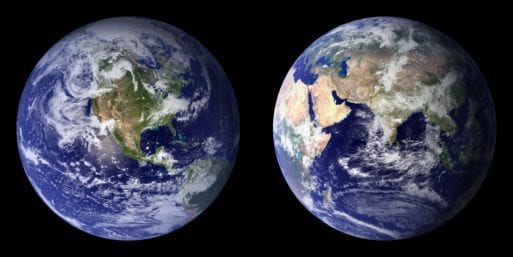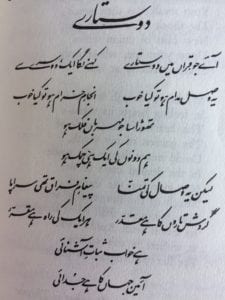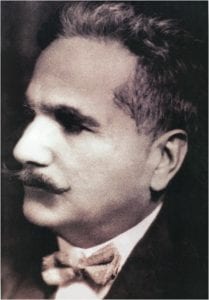
Allama Sir Muhammad Iqbal is considered one of the greatest Muslim poets of the 20th century. Born in the Punjab province of British India in 1873, Iqbal was a champion of the working class and a voice for healthy individuals and communities. He also provided significant inspiration to create the Muslim nation of Pakistan.
Iqbal wrote most of his poetry in Persian, both to reach a wider audience and because the language worked well with his philosophical subject matter. His poetry in Urdu consists of much shorter works, including “Two Planets.” The poem, translated by V.G. Kiernan, recognizes the all-too-human tendency to hold onto those we love:

The Urdu text of “Two Planets”
Two planets meeting face to face,
One to the other cried, ‘How sweet
If endlessly we might embrace,
And here for ever stay! how sweet
If Heaven a little might relent,
And leave our light in one light blent!’
With these words, Iqbal addresses the common bond experienced by two kindred souls who meet “face to face.” Most everyone has had an encounter imbued with the sense that they are truly seeing the other person, and have been truly seen. It is this depth of connection that Iqbal describes – whether between friends, family members or lovers.
Attachment Leads to Loss
All too often, this quality comes with a sense of attachment – a desire to prolong it forever. But all connections are fleeting. In the second stanza, Iqbal acknowledges the inevitability of impermanence and change:
But through that longing to dissolve
In one, the parting summons sounded.
Immutably the stars revolve,
By changeless orbits each is bounded;
Eternal union is a dream,
And severance the world’s law supreme.
In these lines, Iqbal recognizes that separation is inevitable. He also suggests that attachment itself calls it into being. Not only are the two irrevocably linked; one creates the other.
While “Two Planets” speaks to the connection between individuals, the final lines could also be read in relation to Iqbal’s stance on the the growing divisions between Muslims and Hindus in British India. The poet’s home province, Punjab, had roughly equal numbers of both.

Allama Iqbal
Iqbal’s early poetry supported a united India, and he urged brotherhood between Hindus and Muslims. But he later became a proponent of a separate state in northwest India for Muslims. When India gained independence in 1947, the territory split into Muslim Pakistan (including the western part of Punjab) and secular, but Hindu-majority, India. Thus, his once-revolutionary idea became reality. Unfortunately, during the partition, Punjab suffered a devastating massacre in which hundreds of thousands of people were killed.
You can learn more about Allama Iqbal, and read English translations of his poetry, on the International Iqbal Society’s web page.

 “Two Planets” by Allama Iqbal
“Two Planets” by Allama Iqbal


 Terminal Sedation at the End of Life
Terminal Sedation at the End of Life
 National Donate Life Month Reminds Us To Give
National Donate Life Month Reminds Us To Give
 How Dare You Die Now!
How Dare You Die Now!














